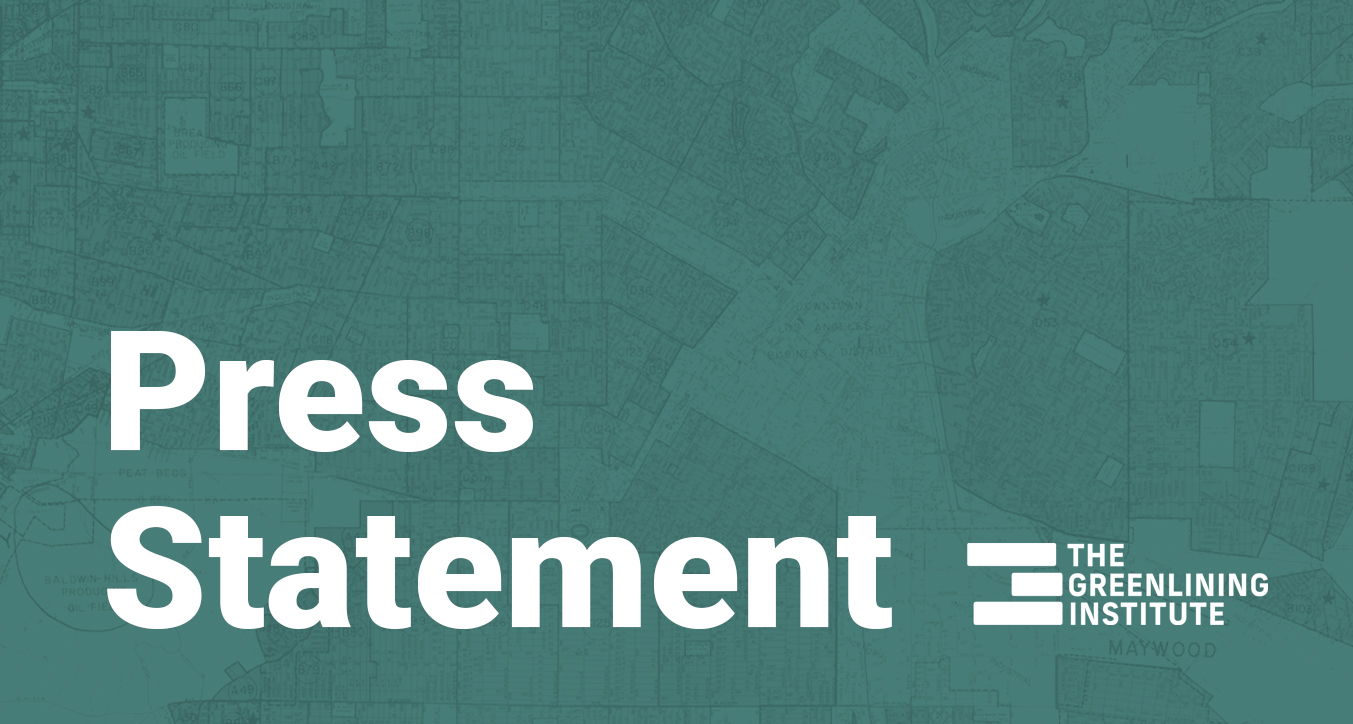Greenlining Our Golden State: Our California State Legislative Agenda

For decades, discriminatory practices like redlining systematically denied economic services, investments, and opportunities to communities of color, triggering cycles of disinvestment and neglect. Deliberate infrastructure policies compounded these inequities, targeting certain communities for highways and industrial facilities, disrupting business corridors and saddling residents with higher levels of pollution. These systemic injustices are deeply interconnected and continue to fuel the racial health, wealth, and opportunity gaps.
Greenlining is the practice of deconstructing systemic discrimination and proactively driving investments and opportunities into formerly redlined communities. The goal of Greenlining is to build a just economy that will pave the way for an abundant future for all.
Greenlined Policies
A just economy is one that is cooperative, sustainable, fair, participatory, and healthy–and getting there requires us to focus on the intersections between economy, climate, and race.
This year, our 2024-25 Legislative Agenda is all about Greenlined Policies–policies that address interconnected systemic injustices with intersectional solutions. Our legislative priorities include sponsored legislation and budget asks that will:
- Drive investments into communities that continue to bear the impacts of historic disinvestment;
- Create transparency into how policy and investment decisions impact California’s communities with an emphasis on understanding inequitable impacts in communities of color;
- Establish accountability for state agencies and lawmakers to embed equity into state initiatives; and,
- Build power and capacity in communities of color that have been marginalized by past inequitable policies and practices
Turning Towards Transportation: Our co-sponsored Legislation
Our transportation system sits at the critical nexus between race, climate, and the economy, informing the health, wealth, and opportunities within our communities. From how transportation funding is allocated, to where heavily polluted highways versus clean mobility infrastructure like electric rails and EV charging stations are located, transportation policies have the potential to shape our communities for the better.
However, inequitable transportation policies have saddled communities of color with higher rates of pollution, limited and less reliable transportation options, and a lack of decision-making power when it comes to transportation decisions that impact them. Greenlined transportation policies aim to deconstruct the systems that resulted in our highly inequitable transportation landscape, while building towards a more just transportation future that equitably connects our communities with healthier air, reliable and clean transportation options, and community ownership over transportation decisions. This will not only improve the lives of communities of color, but support California’s climate and economic goals more broadly.
- AB 2086 (Schiavo) creates badly needed transparency and accountability in California’s transportation investments, paving the way for a more efficient and equitable transportation system.
- AB 2535 (Bonta), The Invest in Clean Air Act, limits freeway expansion projects in formerly redlined communities of color that are most overburdened by pollution, and reinvests those funds into clean energy infrastructure and EV technology to benefit our most vulnerable communities.
- AB 2401 (Ting) modernizes the Clean Cars for All (CC4A) program, increasing zero-emission vehicle (ZEV) incentives for low-income, high-mileage drivers with older, high-polluting vehicles and ensuring program benefits prioritize communities of color and low-income communities that face the highest barriers to transitioning to ZEVs.
Greenlining our transportation policies requires a holistic approach to transportation planning that recognizes the intersectionality of economy, climate, and race. By centering equity and sustainability in decision-making processes, these policies aim to create more just and resilient communities while advancing broader climate and economic goals.
Building Resilience: Our Budget Priorities
Economic downturns have the harshest impacts on communities of color and low-income communities that are already struggling to make ends meet. In the face of rising costs, climate crisis, and widening racial health, wealth, and opportunity gaps–now is the time to fortify resilience in underserved communities, not delay or cut back already underfunded equity programs.
We are urging the California Governor and Legislature to make the following investments to help our communities build resilience and meet the challenges we face today:
- Restore $200 Million to Transformative Climate Communities Program to Uphold Commitment Made in the Historic 2021 California Climate Commitment. TCC is a nationally recognized program that turns community priorities into impactful neighborhood-scale climate projects in communities most impacted by poverty and pollution. Despite overwhelming support for the program from advocates and communities across California, the program was zeroed out in 2023, and in the Governor’s January 2024 proposed budget, cutting over $200M in critical funding for the program. We urge the Governor and Legislature to restore investments for this proven climate justice model through the Greenhouse Gas Reduction Fund (GGRF), the original funding source of this historic program.
- Restore $9.8 million for Strategic Growth Council’s (SGC) Regional Climate Collaboratives (RCC) Program. The SGC was preparing to announce awardees for Round 2 of this critical capacity building program in early 2024. Communities had already spent considerable time, energy and resources preparing for and applying for the RCC grant, and it is highly unacceptable to cut the funding right as it was about to reach communities. The Governor must restore this funding back to the RCC program, which aims to build capacity in disinvested communities to leverage climate investment opportunities.
- $3 million for FY 2024-25 to the California Air Resources Board for the implementation of SB 253 (Wiener, 2023), a globally recognized emissions disclosure standard.
- Avoid further delays and cuts to the Zero-Emission Vehicle (ZEV) Package, while ensuring all FY 2023-24 funding is awarded. Any additional delays or cuts will further set back the state in supporting low-income and disadvantaged communities benefit from ZEVs. The state must also avoid going after unencumbered funds from FY 2023-24 to fill budget gaps.
To stay up to date on our legislative advocacy and progress, subscribe to our newsletter and follow us on social media: Instagram, X/Twitter, Facebook, LinkedIn, and TikTok.
To learn more about The Greenlining Institute’s California Legislative Agenda, please visit our landing page.




